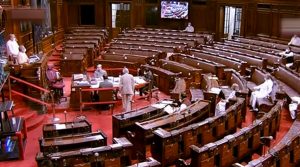Termination Of A Session Of Parliament:

The Lok Sabha was adjourned Sine Die two days ahead of its scheduled date of August 13, as the Opposition protested over the Pegasus snooping controversy, farm laws and other issues.
Important Parliament Terminology:
- Zero Hour — time allotted to individuals members to raise important issues — was most affected and Question Hour, too, witnessed disruptions on most of the days.
- The House managed to pass 20 Bills, mostly without debate or participation from the Opposition.
- A sitting of Parliament can be terminated by adjournment or adjournment sine die or prorogation or dissolution (in the case of the Lok Sabha).
- Adjournment: It suspends the work in a sitting for a specified time, which may be hours, days or weeks.
- Adjournment sine die: It means terminating a sitting of Parliament for an indefinite period.
- In other words, when the House is adjourned without naming a day for reassembly.
- The power of adjournment as well as adjournment sine die lies with the presiding officer (Speaker or Chairman) of the House.
- Prorogation: The President issues a notification for prorogation of the session after the business of a session is completed and the presiding officer declares the House adjourned sine die. The President can also prorogue the House while in session.
- Dissolution: Only the Lok Sabha is subject to dissolution. Rajya Sabha, being a permanent House, is not subject to dissolution.
- A dissolution ends the life of the existing House, and a new House is constituted after general elections are held.
- The President is empowered to dissolve the Lok Sabha.




